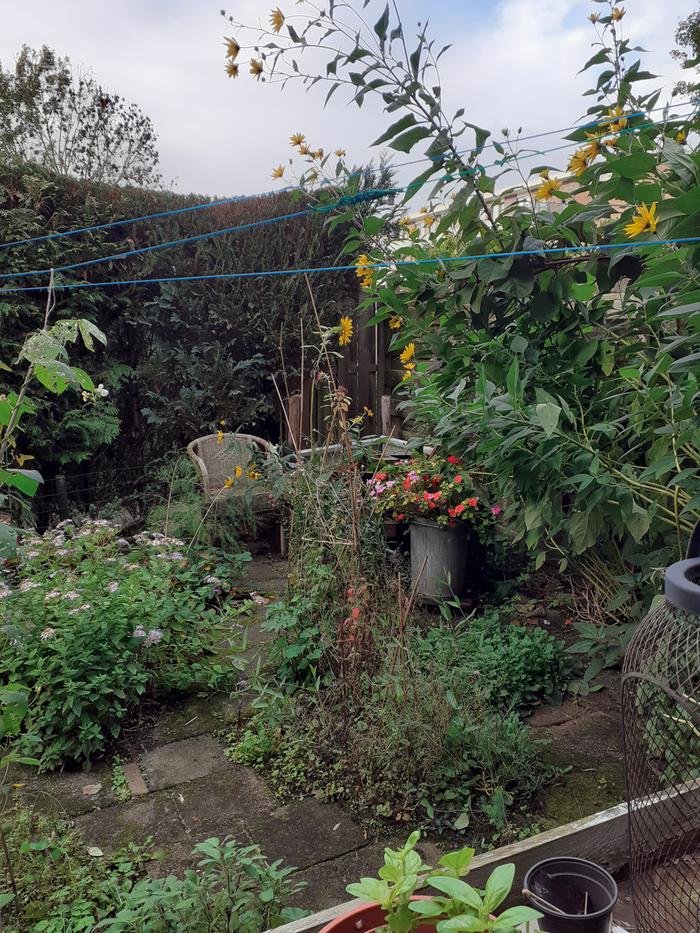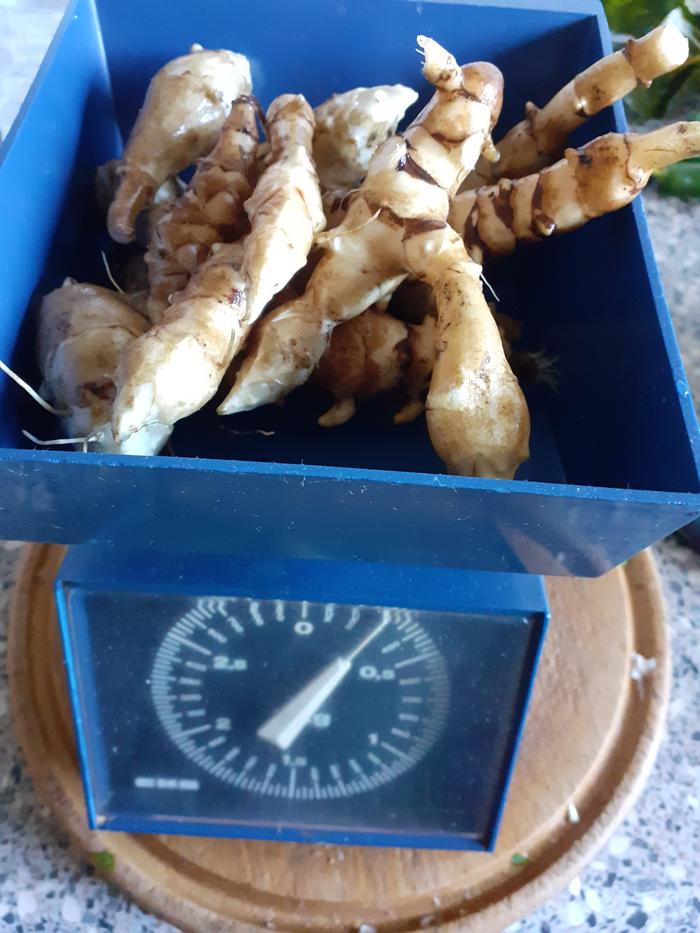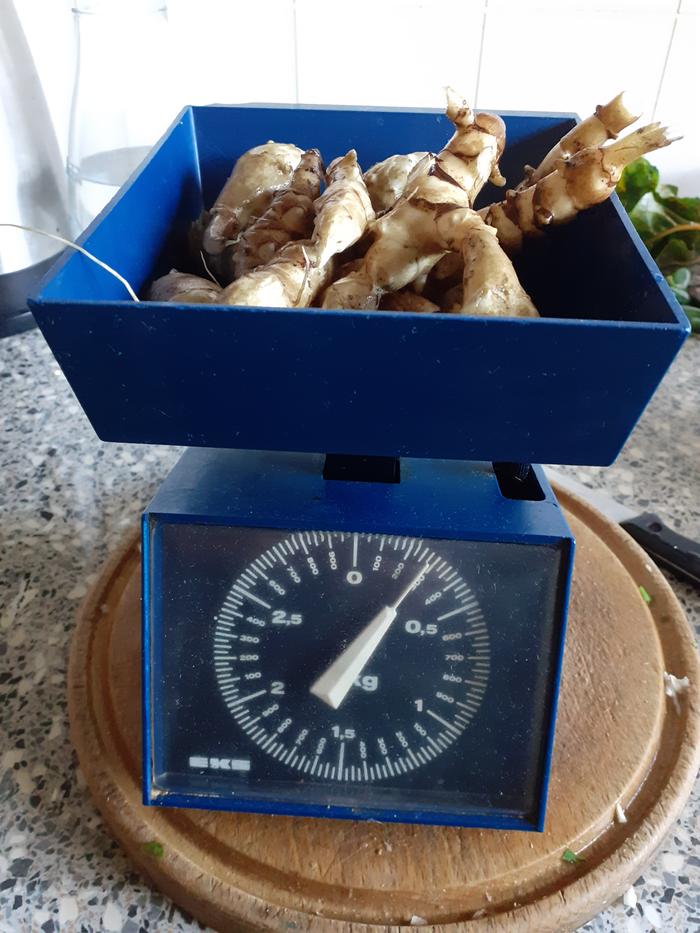
 5
5




Zone 6, 45 inches precipitation, hard clay soil




 8
8




Try Linux on your computer, free, no virus worries, stable and maintenance free. Distributions I recommend are Linux-Mint and Debian. Better than throwing your PC away when Windows rejects you.
 8
8




Try Linux on your computer, free, no virus worries, stable and maintenance free. Distributions I recommend are Linux-Mint and Debian. Better than throwing your PC away when Windows rejects you.

 5
5




I kind of like best the ones that taste like pine-sap and medicine. :)Blaine Clark wrote:They were, however so obnoxiously turnipy/herbal flavored that one tuber chunked into a large soup pot nearly overpowered the soup. I got rid of them.
 5
5




Christopher Weeks wrote:
I kind of like best the ones that taste like pine-sap and medicine. :)Blaine Clark wrote:They were, however so obnoxiously turnipy/herbal flavored that one tuber chunked into a large soup pot nearly overpowered the soup. I got rid of them.
$10.00 is a donation. $1,000 is an investment, $1,000,000 is a purchase.












 5
5




 6
6




Christopher Weeks wrote:I want to read this and think about a response with some time, but to answer your simplest question, our ground is frozen from the end of October through the end of April. And that’s why I need to hurry with my harvest.












 4
4




Cécile Stelzer Johnson wrote:You do not mention deer pressure, and that's surprising to me because they love the young tips as much as I love asparagus, and they will keep coming night after night, snipping everything they can in the spring. That will eventually kill a patch that is not fenced, as the plant is never allowed to grow to its full stature, so it cannot grow tubers either.
...
If you are a hunter, deer love sunchokes almost as much as they love apples... Just saying...












 4
4




paul wheaton wrote:
Christopher Weeks wrote:our ground is frozen from the end of October through the end of April. And that’s why I need to hurry with my harvest.
I think that the ground where the sunchokes are will be softer. And, I suspect that you will have a lot of days where the ground will be soft enough.
 6
6




Christopher Weeks wrote:
Cécile Stelzer Johnson wrote:You do not mention deer pressure, and that's surprising to me because they love the young tips as much as I love asparagus, and they will keep coming night after night, snipping everything they can in the spring. That will eventually kill a patch that is not fenced, as the plant is never allowed to grow to its full stature, so it cannot grow tubers either.
...
If you are a hunter, deer love sunchokes almost as much as they love apples... Just saying...
This remains a fascinating distinction to me. We have substantial deer pressure. They ruin any apple trees left small and unfenced. They eat the hell out of my brassicas, including digging up turnips after the first couple freezes. I have never once seen any sign that the deer have the slightest interest in sunchokes.












 6
6




 9
9




Christopher Weeks wrote:I’ve been thinking about this issue of running short on time. I normally wait for the stalks to start drying down before I do any harvesting. But that doesn’t leave very much time before the ground freezes. So I just went out and scooped up six or 8 inches of sand underneath four stalks that were only 2 to 3 feet tall just right on the edge of my patch. I still got a reasonable handful of tubers for almost no work.
 10
10
















 8
8




 10
10




Christopher Weeks wrote:So if you leave them over time to do that, do they produce abundantly on the rim of the circle and poorly in the center? Do they allow other things to grow mid-field?
 12
12





"Also, just as you want men to do to you, do the same way to them" (Luke 6:31)
 3
3




Inge Leonora-den Ouden wrote:Hi. My Sunchokes are flowering beautifuly. Here's a photo so you can enjoy them too.

$10.00 is a donation. $1,000 is an investment, $1,000,000 is a purchase.
 7
7




Cécile Stelzer Johnson wrote:
As far as "the bumper crops that I see others harvesting", we tend to think of sunchokes as an indestructible tuber that loves neglect. That's not quite true: if we want bumper crops, we have to nourish that crop and limit the weeds or we'll get pretty puny and twisted tubers, just like any other crop.
Zone 6, 45 inches precipitation, hard clay soil










 10
10






"Also, just as you want men to do to you, do the same way to them" (Luke 6:31)






 4
4




Cécile Stelzer Johnson wrote:
Inge Leonora-den Ouden wrote:Hi. My Sunchokes are flowering beautifuly. Here's a photo so you can enjoy them too.

thanks for the pic. I'm in Central WI, zone 4B n our weather has been so warm and the days so long that I too have a few flowers on some of my sunchokes. It's going to freeze tonight. our first frost of the year, which is surprising.. Then I can start harvesting my sunchokes. Well, it may not be a big crop as the deer have been coming when the plants were small. But some escaped their ravages. I can't wait! We'll see. I'll have to harvest my sweet potatoes too!
"Also, just as you want men to do to you, do the same way to them" (Luke 6:31)
 2
2




May Lotito wrote:
Cécile Stelzer Johnson wrote:
As far as "the bumper crops that I see others harvesting", we tend to think of sunchokes as an indestructible tuber that loves neglect. That's not quite true: if we want bumper crops, we have to nourish that crop and limit the weeds or we'll get pretty puny and twisted tubers, just like any other crop.
Cecile's remark reminded me of one of my sunchoke patches. The soil is of low fertility, even though I top dresses with compost and the plants seemed lush, there were few tubers to harvest. I dug a few plants and found out there was only one for each plant, even smaller than I originally planted! Where did all the carbohydrates go? So I left them as and the next year they regrew, and this time it was even worse, when summer drought set in, all the plants just turned black and died. Something is seriously wrong with the soil and sunchokes are not indestructible.
$10.00 is a donation. $1,000 is an investment, $1,000,000 is a purchase.
 5
5




Cécile Stelzer Johnson wrote:...............
[i]"Sunchokes thrive in full sun and loose, well-drained soil with a pH between \(5.8\) and \(6.2\). While they are hardy and grow in many conditions, they produce the best crop in loose soil that allows for tuber expansion, making harvesting easier. Sunchokes are adapted to a wide range of climates, growing well from USDA hardiness zones 3 through 8. Soil Ideal: Sunchokes prefer loose, well-drained soil. Adding aged compost or sand can improve heavier soils.
pH: An ideal soil pH is between \(5.8\) and \(6.2\). They can tolerate a wider range from \(4.5\) to \(8.2\).
Tolerance: The plants will grow in a wide variety of soil types, even poor or rocky ones.
Drainage: Avoid heavy, waterlogged clay soil, as this can result in smaller tubers and make harvesting difficult. Climate Sunlight: They do best in full sun but will tolerate partial shade.
“The most important decision we make is whether we believe we live in a friendly or hostile universe.”― Albert Einstein
 7
7




John Weiland wrote:
Cécile Stelzer Johnson wrote:...............
[i]"Sunchokes thrive in full sun and loose, well-drained soil with a pH between \(5.8\) and \(6.2\). While they are hardy and grow in many conditions, they produce the best crop in loose soil that allows for tuber expansion, making harvesting easier. Sunchokes are adapted to a wide range of climates, growing well from USDA hardiness zones 3 through 8. Soil Ideal: Sunchokes prefer loose, well-drained soil. Adding aged compost or sand can improve heavier soils.
pH: An ideal soil pH is between \(5.8\) and \(6.2\). They can tolerate a wider range from \(4.5\) to \(8.2\).
Tolerance: The plants will grow in a wide variety of soil types, even poor or rocky ones.
Drainage: Avoid heavy, waterlogged clay soil, as this can result in smaller tubers and make harvesting difficult. Climate Sunlight: They do best in full sun but will tolerate partial shade.
This would explain why our decades-old patch produces such puny tubers. They aren't bad to eat and can be relatively abundant in certain years, but rarely are larger than your thumb. Our soil (zone 4/3) is on the heavy side of clay and poor in drainage even as the organic matter is quite high. Soil pH hovers around 7-8. I think our sunchokes are feeling the insults of these conditions....and the presence of a little invasive worm/grub in many of the tubers doesn't help matters. But none of this effects its hardiness and intentions on taking over the garden! ;-)
$10.00 is a donation. $1,000 is an investment, $1,000,000 is a purchase.
 10
10




Zone 6, 45 inches precipitation, hard clay soil




 13
13




"We carry a new world here, in our hearts..." --Buenaventura Durruti
"Don't wish it were easier. Instead, wish you were better." --Jim Rohn

|
I met your mom on a Carribean cruise and she said you would help me and this tiny ad:
Permaculture Voices 1 - All the Video Here!
https://permies.com/wiki/pv1
|





.jpg)
